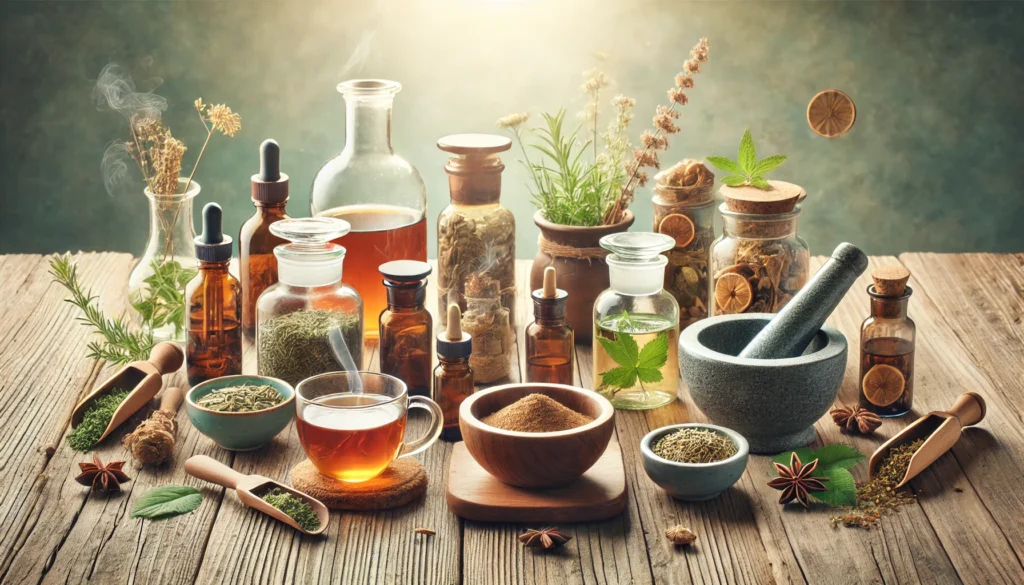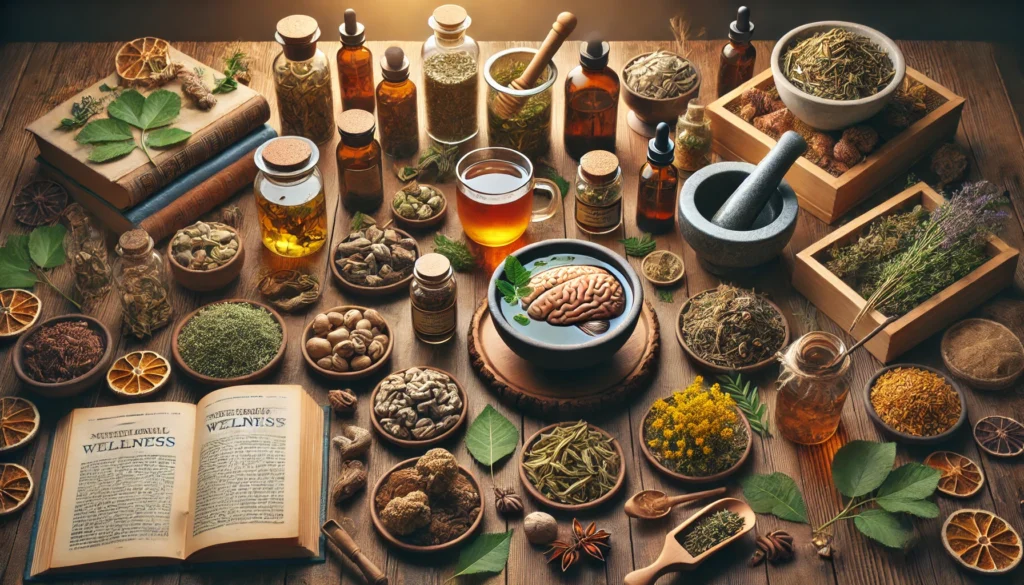Herbal remedies have been used across various cultures to enhance mental clarity and cognitive performance long before the advent of modern pharmaceuticals. Ancient civilizations, from the Egyptians to the Chinese, have documented the use of plants for medicinal purposes. Understanding the historical context of these herbs provides a rich tapestry of knowledge that informs current practices.
You may also like: Natural Supplements for Effective Anxiety Relief

Ancient Civilizations and Their Herbal Practices
Ancient Egypt is one of the earliest civilizations known to have utilized herbs for medicinal purposes. The Ebers Papyrus, a medical document from around 1550 BC, outlines numerous herbal remedies. Egyptians believed in the power of herbs like rosemary and mint to enhance memory and focus.
Similarly, the Greeks and Romans adopted and expanded upon Egyptian herbal knowledge. Renowned figures like Hippocrates and Galen emphasized the use of plants such as sage and fennel for mental clarity. These practices laid the foundation for Western herbal medicine.
The Role of Ayurveda and Traditional Chinese Medicine
In India, Ayurveda has utilized herbs like Bacopa Monnieri and Ashwagandha for thousands of years. These herbs are considered essential for balancing the mind and improving cognitive functions. Ayurveda emphasizes the holistic approach, integrating diet, lifestyle, and herbal remedies.
Traditional Chinese Medicine (TCM) also has a long history of using herbs to enhance cognitive health. Ginkgo Biloba, for instance, has been a staple in TCM, celebrated for its ability to improve circulation and brain function. The synergy of various herbs in TCM offers a comprehensive approach to mental well-being.
Transition from Traditional to Modern Medicine
With the rise of modern medicine, the use of herbal remedies experienced a decline. However, as interest in natural solutions resurged, so did the scientific exploration of these ancient practices. Researchers are now validating the efficacy of herbs like Rhodiola Rosea and Gotu Kola, bridging the gap between traditional wisdom and modern science.
Best Herbs for Focus and Concentration
When it comes to boosting focus and concentration, certain herbs stand out for their potent effects and minimal side effects. Here are some of the most effective herbs that can be incorporated into your daily regimen:
Ginkgo Biloba: The Memory Enhancer
Ginkgo Biloba is one of the oldest living tree species and has been used in traditional Chinese medicine for thousands of years. It is known for its ability to improve memory and cognitive speed. Studies suggest that Ginkgo enhances blood flow to the brain, which can aid in memory retention and cognitive processing.
Ginkgo Biloba’s compounds, flavonoids, and terpenoids, are believed to have strong antioxidant properties. These antioxidants help protect brain cells from oxidative stress, which is a common cause of cognitive decline. Regular use of Ginkgo Biloba is associated with improved attention and mental clarity.
Moreover, Ginkgo Biloba is often used to support patients with Alzheimer’s and dementia. While it is not a cure, it can help slow cognitive deterioration. Its neuroprotective properties make it a valuable ally in maintaining mental sharpness as we age.
Bacopa Monnieri: The Brain Tonic
Often referred to as a “brain tonic,” Bacopa Monnieri is an herb used in Ayurvedic medicine to enhance cognitive function. It is believed to improve memory and reduce anxiety and stress, making it a powerful ally in maintaining focus and concentration. Bacopa is also noted for its antioxidant properties, which protect brain cells from damage.
Bacopa Monnieri contains active compounds called bacosides, which play a crucial role in repairing damaged neurons and boosting brain signal transmission. This action helps in enhancing cognitive functions such as attention span and information processing.
In addition to its cognitive benefits, Bacopa Monnieri is also used to promote emotional balance. It helps regulate neurotransmitters like serotonin, providing a sense of calm and reducing mental fatigue. This dual action of mental clarity and emotional stability makes Bacopa a well-rounded herb for cognitive health.
Rhodiola Rosea: The Adaptogen for Mental Energy
Rhodiola Rosea is an adaptogen, meaning it helps the body adapt to stress and maintain balance. It is particularly effective in reducing mental fatigue and boosting concentration. Research indicates that Rhodiola can enhance mental performance and alleviate burnout, making it a go-to herb for those seeking sustained mental energy.
The active compounds in Rhodiola, rosavins, and salidrosides, are known to enhance the transport of oxygen and nutrients to the brain, thereby improving cognitive functions. This increased efficiency allows for better focus and mental endurance, especially during demanding tasks.
Rhodiola Rosea is also praised for its ability to modulate the body’s stress response. By balancing cortisol levels, it helps maintain mental clarity and reduces the feeling of overwhelm. This makes it an ideal choice for individuals facing high-stress situations while needing to maintain peak cognitive performance.

Herbs that Increase Brain Function and Energy
Beyond focus and concentration, some herbs are particularly effective at enhancing overall brain function and energy levels. These herbs work to improve cognitive capabilities, mood, and mental stamina.
Panax Ginseng: The Energizer
Panax Ginseng, often simply called Ginseng, is renowned for its energy-boosting properties. It has been shown to improve mood, enhance cognitive function, and increase stamina. Ginseng is believed to work by modulating inflammation and oxidative stress, thereby supporting brain health and energy.
Ginseng contains ginsenosides, which are responsible for its cognitive-enhancing effects. These compounds help in increasing the brain’s uptake of glucose, providing it with a direct source of energy. As a result, users often experience heightened alertness and improved reaction times.
The adaptogenic properties of Ginseng also play a critical role in its effectiveness. By enhancing the body’s resistance to stress, it helps maintain mental balance and prevent burnout. This makes Ginseng a popular choice for boosting both physical and mental energy.
Ashwagandha: The Stress Reliever
Ashwagandha is another powerful adaptogen that is prized for its ability to reduce stress and promote mental clarity. It works by lowering cortisol levels in the body, which can help improve mood and cognitive function. Ashwagandha is also noted for its potential to boost brain-derived neurotrophic factor (BDNF), a protein that supports the growth of new neurons.
The active constituents of Ashwagandha, withanolides, are responsible for its neuroprotective effects. They help in repairing and regenerating neuronal networks, which is essential for maintaining cognitive health. This regenerative capacity is particularly beneficial for enhancing memory and learning abilities.
Beyond cognitive enhancement, Ashwagandha is also known for its mood-stabilizing properties. It promotes a balanced emotional state, reducing anxiety and enhancing mental resilience. This makes it an excellent herb for maintaining mental wellness in high-pressure environments.
Gotu Kola: The Brain Revitalizer
Gotu Kola is often referred to as the “herb of longevity” and is used in both Ayurvedic and Chinese medicine. It is known for its ability to improve circulation, which can enhance cognitive functions such as memory and concentration. Gotu Kola is also believed to have neuroprotective effects, helping to maintain brain health over time.
The triterpenoids in Gotu Kola are credited for its cognitive benefits. These compounds help strengthen blood vessels and improve microcirculation, ensuring that the brain receives adequate oxygen and nutrients. This enhanced circulation supports mental clarity and focus.
Gotu Kola is also celebrated for its calming effects on the nervous system. It helps in reducing anxiety and promoting a sense of tranquility, which can lead to better cognitive performance. This combination of mental clarity and emotional calm makes Gotu Kola a versatile herb for cognitive enhancement.
Incorporating Herbal Remedies into Your Routine
Herbal remedies can be consumed in various forms, including teas, capsules, tinctures, and extracts. It is important to consult with a healthcare provider before incorporating new herbs into your routine, especially if you are currently taking medication or have underlying health conditions.
Choosing the Right Form of Consumption
The form in which you consume herbs can significantly impact their effectiveness. Teas and tinctures are quickly absorbed, providing fast-acting benefits, while capsules and extracts offer convenience and precise dosages. Understanding the pros and cons of each form can help tailor your herbal regimen to your needs.
Practical Tips for Use
- Start Slow: Begin with a low dosage to assess your body’s response.
- Consistency is Key: Regular use over time can yield the best results.
- Monitor Effects: Keep track of any changes in cognitive function and energy levels.
In addition to these tips, integrating herbs into a balanced lifestyle is crucial. Combining herbal remedies with a healthy diet, regular exercise, and adequate sleep can amplify their cognitive benefits. This holistic approach ensures that the body and mind are in optimal condition to absorb the full benefits of herbal remedies.
Safety and Interactions
Understanding potential interactions between herbs and medications is essential for safe consumption. Some herbs may enhance or inhibit the effects of certain drugs, leading to unexpected outcomes. Consulting a healthcare professional can provide personalized advice, ensuring that your herbal routine complements your overall health strategy.

Future Implications and Trends
As interest in natural health solutions continues to grow, the future of herbal cognitive enhancers looks promising. Ongoing research aims to uncover new insights into the mechanisms of these herbs and their potential applications in treating cognitive disorders. Furthermore, the integration of technology with traditional herbal medicine could pave the way for personalized herbal treatment plans.
The Role of Research and Innovation
The scientific community is increasingly focusing on uncovering the bioactive compounds in herbs and understanding their mechanisms of action. Advanced technologies, such as AI and machine learning, are being employed to predict herb-drug interactions and personalize herbal treatments. This innovation could revolutionize how we approach cognitive health.
Personalized Herbal Medicine
The future of herbal cognitive enhancers lies in personalized medicine. By considering individual genetic makeup and lifestyle factors, personalized herbal plans can optimize cognitive enhancement. This approach ensures that each person receives the most effective and safe herbal regimen tailored to their specific needs.
Global Trends and Sustainability
As the demand for herbal remedies rises, sustainability becomes a critical concern. Ensuring ethical sourcing and cultivation practices will be essential to preserve these valuable resources. Global cooperation and policy development can ensure that the benefits of herbal medicine are accessible to all, without compromising the environment.
Conclusion
Herbal remedies offer a natural, holistic approach to enhancing cognitive health. From improving focus and concentration to boosting overall brain function and energy, these botanicals provide a viable alternative to synthetic drugs. As we continue to explore the rich history and promising future of herbs for cognitive enhancement, we can harness the power of nature to achieve optimal mental performance.
Incorporating these herbs into your wellness routine could be the key to unlocking your brain’s potential, empowering you to meet the demands of a fast-paced world with clarity and vitality. By embracing the wisdom of the past and the innovations of the present, herbal remedies can lead us towards a future of enhanced cognitive health and well-being.
Further Reading:
7 Best Herbs for Memory and Brain Health
The 10 Best Herbs to Boost Energy and Focus
Important Note: The information contained in this article is for general informational purposes only, and should not be construed as health or medical advice, nor is it intended to diagnose, prevent, treat, or cure any disease or health condition. Before embarking on any diet, fitness regimen, or program of nutritional supplementation, it is advisable to consult your healthcare professional in order to determine its safety and probable efficacy in terms of your individual state of health.
Regarding Nutritional Supplements Or Other Non-Prescription Health Products: If any nutritional supplements or other non-prescription health products are mentioned in the foregoing article, any claims or statements made about them have not been evaluated by the U.S. Food and Drug Administration, and such nutritional supplements or other health products are not intended to diagnose, treat, cure, or prevent any disease.


